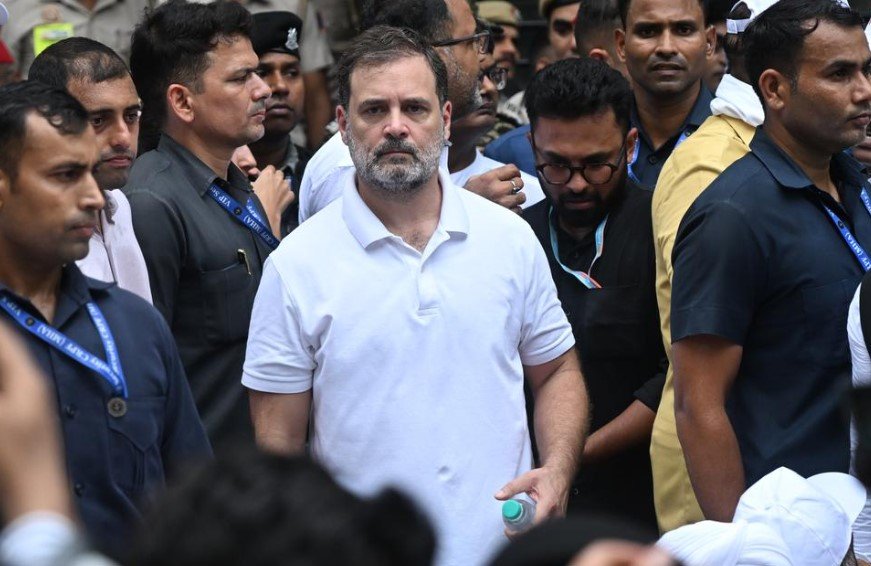Dozens of opposition politicians, led by Rahul Gandhi, took to the streets of New Delhi on August 11, 2025, to protest alleged electoral malpractices. The tense demonstration, which saw leaders shouting slogans and clashing with police barricades, ended with many detained — marking a rare and significant public challenge to India’s Election Commission.
Opposition Charges Cast Shadow Over India’s Electoral Integrity
For decades, India’s elections have largely been seen as free and fair, especially given the country’s massive scale as the world’s largest democracy. But this recent protest shook that confidence. Opposition parties, especially the Congress, have accused the Election Commission of tampering with voter lists to skew results in favor of Prime Minister Narendra Modi’s Bharatiya Janata Party (BJP).
Rahul Gandhi, a key figure in Indian politics and leader of the Congress, was at the forefront. He accused authorities of removing legitimate voters from the rolls or inserting duplicate names in BJP-leaning states — a move he called a direct attack on the democratic process. “This fight is not political. This fight is to save the constitution,” Gandhi said, emphasizing the stakes involved.
The protest drew around 300 leaders who marched from the Parliament complex toward the Election Commission’s office, only to be stopped by police well short of their destination. The scene was chaotic: chants echoed, protesters tried to push past barricades, and law enforcement moved in to detain dozens, loading them into buses.

Government Pushback and Election Commission’s Defense
The BJP swiftly pushed back against the opposition’s claims, accusing them of fomenting “anarchy” after facing a series of electoral setbacks. Party spokespeople dismissed the allegations as baseless attempts to undermine the democratic process and destabilize the government.
Meanwhile, the Election Commission, the autonomous body overseeing elections, stood firm. It denied any wrongdoing and defended the revisions to voter lists as routine and necessary to maintain accuracy. According to officials, updating electoral rolls often means removing duplicates, deceased voters, or people who have relocated — standard practices in democracies worldwide.
However, critics argue the timing and scale of these revisions in BJP-stronghold regions raise eyebrows. Some experts warn that even the perception of manipulation can severely erode public trust in elections — a fragile commodity in any democracy.
The Political Stakes Are High
Modi’s government has faced growing challenges lately. With over a decade in power, cracks are appearing within the ruling party’s support base, and opposition forces are eager to capitalize. The electoral roll controversy could be a turning point.
For the opposition, this protest was more than just a march. It was a desperate bid to rally public attention and pressure the Election Commission for transparency. Analysts suggest that if these allegations gain traction, they could hurt Modi politically, especially ahead of upcoming elections.
Still, many voters remain skeptical, torn between fierce political loyalties and weariness over constant mudslinging. One New Delhi resident watching the protest remarked, “Politics here is always loud, but sometimes you wonder who’s really telling the truth.”
Broader Implications for India’s Democracy
India’s democratic health depends heavily on the perception of free and fair elections. When major parties publicly accuse the system of rigging, it invites uncertainty and cynicism among voters. Election experts stress the importance of swift, transparent investigations to address these claims and restore confidence.
This event also highlights the broader tensions simmering beneath India’s political surface — between the ruling BJP’s consolidation of power and the opposition’s attempts to push back. It’s a high-stakes chess game with the world watching closely.
What Happens Next?
For now, the detained leaders face legal proceedings, and the government promises to keep a tight grip on public order. But the underlying electoral concerns remain unresolved.
Will the Election Commission launch a thorough review? Can opposition leaders sustain momentum in rallying public support? And perhaps most importantly — can India’s democracy weather this storm without lasting damage?
Only time will tell.
